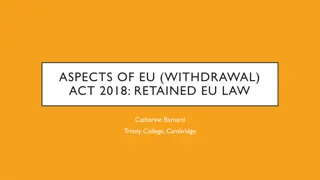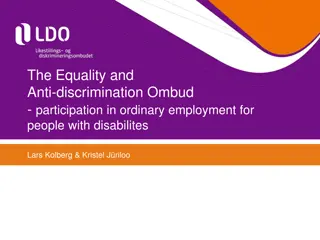Equality Law Through Brexit and the Impact of Acquis Communautaire
Brexit has significant implications for equality law in the UK. Understanding the history and contributions of EU law, particularly the Acquis Communautaire, is crucial. The Acquis has introduced new protected characteristics and expanded existing ones in the UK, shaping legislation on sex discrimination, race equality, disability rights, and more.
Download Presentation

Please find below an Image/Link to download the presentation.
The content on the website is provided AS IS for your information and personal use only. It may not be sold, licensed, or shared on other websites without obtaining consent from the author.If you encounter any issues during the download, it is possible that the publisher has removed the file from their server.
You are allowed to download the files provided on this website for personal or commercial use, subject to the condition that they are used lawfully. All files are the property of their respective owners.
The content on the website is provided AS IS for your information and personal use only. It may not be sold, licensed, or shared on other websites without obtaining consent from the author.
E N D
Presentation Transcript
Equality law through Brexit Laith Dilaimi Old Square Chambers
EQUALITY LAW: THE PAST
EQUALITY LAW: MADE IN BRITAIN? Race Relations Acts 1965 and 1976 Equal Pay Act 1970 Sex Discrimination Act 1975 Disability Discrimination Act 1995 Human Rights Act 1998 (ECHR, but not EU) Remember: the UK opted out of the Social Chapter until the Treaty of Amsterdam (which came into force in 1999).
EU LAW: THE ACQUIS COMMUNAUTAIRE The acquis communautaire consists of: Treaties Regulations Directives Decisions of the ECJ/CJEU (inc. references) Charter of Fundamental Rights of the European Union (NB: although the UK opted out of direct application of the Charter, the CJEU uses the Charter to interpret all EU law) Etc.
WHAT HAS THE ACQUIS COMMUNAUTAIRE EVER DONE FOR US? (1) 1. New protected characteristics As a direct result of the Employment Equality Framework Directive 2000/78/EC, protection for the following characteristics was introduced: Sexual orientation (Employment Equality (Sexual Orientation) Regulations 2003); Religion or belief (Employment Equality (Religion Or Belief) Regulations 2003); Age (Employment Equality (Sexual Orientation) Regulations 2003).
WHAT HAS THE ACQUIS COMMUNAUTAIRE EVER DONE FOR US? (2) 2. Existing protected characteristics EU law has extended and clarified UK equal pay provisions. Professor Michael Ford QC, Old Square Chambers and Bristol University: It is difficult to overstate the significance of EU law in protecting against sex discrimination. The Race Equality Directive (2000/43/EC12) led to the expansion and improvement of UK race discrimination provisions, and gave us a more extended definition of direct discrimination and indirect discrimination. The Framework Employment Directive (2000/78/EC) brought about certain changes to the Disability Discrimination Act 1995 (such as the abolition of the exemption for employers with less than 15 employees). The Pregnant Workers Directive (1992/85/EEC4) gave women the right to paid time off for ante-natal appointments. It also required employers to assess the health and safety of pregnant employees at work.
WHAT HAS THE ACQUIS COMMUNAUTAIRE EVER DONE FOR US? (3) 3. CJEU decisions (1) P v S and Cornwall County Council Case C-13/94 this case established protection from discrimination on grounds of gender reassignment. This was thanks to the Equal Treatment Directive (76/207/EEC). The UK government made submissions to the CJEU that issues relating to transsexuality are matters of principle and policy which cannot properly be addressed within the context of a Directive designed to secure equal treatment between men and women. The CJEU rejected the UK government s submissions and even the EC s submissions. CJEU: To tolerate [discrimination against a transgender person on grounds of gender reassignment] would be tantamount to a failure to respect the dignity and freedom to which he or she is entitled, and which the Court has a duty to safeguard.
WHAT HAS THE ACQUIS COMMUNAUTAIRE EVER DONE FOR US? (4) 4. CJEU decisions (2) Coleman v. Attridge Law and Steve Law Case C-303/06 this case established the principle of discrimination by association. This was thanks to the Employment Equality Framework Directive (2000/78/EC). The UK government, among other national governments, argued that the prohibition of direct discrimination under the Directive covers only those people discriminated against on the basis of characteristics which are particular to them. The CJEU held that an interpretation of the Directive limiting its application only to people who are themselves disabled is liable to deprive that Directive of an important element of its effectiveness and to reduce the protection which it is intended to guarantee.
WHAT HAS THE ACQUIS COMMUNAUTAIRE EVER DONE FOR US? (5) 5. And other equality-related measures Access to properly paid holidays (Working Time Directive 2003) Rights to unpaid parental leave (Parental Leave Directive 2010) Rights to time off from work for urgent family reasons (Parental Leave Directive 2010) Equal treatment rights for part time workers (Part-time Work Directive 1997) Equal treatment rights for fixed term workers (Fixed-term Work Directive 1999) Equal treatment rights for agency workers (Temporary Agency Work Directive 2008) And so on
EQUALITY LAW: THE PRESENT
CURRENT EQUALITY PROTECTIONS Equality Act 2010 UK statute Acquis Communautaire Lord Bridge in R v. Secretary of State for Transport, ex p. Factortame (No. 2) [1991] 1 All ER 70: Under the terms of the [European Communities Act 1972] it has always been clear that it was the duty of the United Kingdom court, when delivering final judgment, to override any rule of domestic law found to be in conflict with any directly enforceable rule of Community law. The acquis communautaire informs UK courts interpretation of UK law: see Walker v Innospec Ltd [2017] IRLR 928 (Supreme Court, July 2017), in which it was held that a restriction permitted by Schedule 9 of the Equality Act 2010 (on payment of occupational pension benefits to same-sex partners and spouses based on an employee's period of service before 5 December 2005) was incompatible with the prohibition against discrimination on grounds of sexual orientation in the Employment Equality Framework Directive. see also recent CJEU case law on whether obesity constitutes a disability
EQUALITY LAW: THE FUTURE
LEGISLATING FOR BREXIT The European Union (Withdrawal) Bill 2017-2019 ( the Great Repeal Bill ) The White Paper ( Legislating for the United Kingdom s Withdrawal from the European Union ) was published on 30 March 2017. The Bill was published on 13 July 2017 and had its first reading in the House of Commons on the same day. The Bill passed its second reading in the House of Commons on 11 September 2017 (326 votes for, 290 against). The next stage will be the Committee stage. It will be a Committee of the Whole House. Approx. 177 amendments have been tabled for the Committee to consider. The Bill will then have to pass a third reading in the House of Commons. The Bill will then go to the House of Lords and have to pass through the same stages. There may then be a final consideration of amendments by both Houses. Then Royal Assent, which will have to be before the end of the 2017-2019 Parliament or Brexit day, whichever is sooner.
THE PURPOSE OF THE EU (WITHDRAWAL) BILL The Bill (as drafted) is designed to: repeal the European Communities Act 1972 with effect from the 'exit day ; and simultaneously make all existing EU law as it applies in the UK into domestic law; and give the Government the power to correct or remove the laws that would otherwise not function properly once the UK has left the EU. If the Bill becomes law, then the Westminster Parliament will subsequently be able to tinker with/do away with the old EU law (now UK law) at leisure and as it sees fit.
THE EU (WITHDRAWAL) BILL: CLAUSES 1 & 2 Clause 1 Repeal of the European Communities Act 1972 The European Communities Act 1972 is repealed on exit day*. Clause 2(1) Saving for EU-derived domestic legislation EU-derived domestic legislation, as it has effect in domestic law immediately before exit day*, continues to have effect in domestic law on and after exit day*. * When is exit day ? Not necessarily 29 March 2019. See Clause 14(1): exit day means such day as a Minister of the Crown may by regulations appoint. And note that the House of Lords Constitution Committee (in para. 20 of its September 2017 interim report on the Bill) has expressed concern that the power to define the exit day is not subject to any parliamentary scrutiny, and that Sch. 7 para. 3 of the Bill could allow ministers to designate a different exit day for different parts of the Bill.
THE EU (WITHDRAWAL) BILL: CLAUSES 3 & 4 Clause 3(1) Incorporation of direct EU legislation Direct EU legislation, so far as operative immediately before exit day, forms part of domestic law on and after exit day. Clause 4(1) Saving for rights etc. under section 2(1) of the ECA Any rights, powers, liabilities, obligations, restrictions, remedies and procedures which, immediately before exit day (a) are recognised and available in domestic law by virtue of section 2(1) of the European Communities Act 1972, and (b) are enforced, allowed and followed accordingly, continue on and after exit day to be recognised and available in domestic law (and to be enforced, allowed and followed accordingly).
THE EU (WITHDRAWAL) BILL: CLAUSE 5 Clause 5 Exceptions to savings and incorporation (1) The principle of the supremacy of EU law does not apply to any enactment or rule of law passed or made on or after exit day. (2) Accordingly, the principle of the supremacy of EU law continues to apply on or after exit day so far as relevant to the interpretation, disapplication or quashing of any enactment or rule of law passed or made before exit day.
THE EU (WITHDRAWAL) BILL: CLAUSE 5 (CONT.) Clause 5 (cont.) (4) The Charter of Fundamental Rights is not part of domestic law on or after exit day. (5) Subsection (4) does not affect the retention in domestic law on or after exit day in accordance with this Act of any fundamental rights or principles which exist irrespective of the Charter (and references to the Charter in any case law are, so far as necessary for this purpose, to be read as if they were references to any corresponding retained fundamental rights or principles).
THE EU (WITHDRAWAL) BILL: CLAUSE 5 (CONT.) But Amendment 8 (tabled by Dominic Grieve, 8 other Conservative MPs, and assorted Labour, Lib Dem, SNP and Green MPs) proposes deleting Clauses 5(4) and 5(5). Member s explanatory statement to Amendment 8: To allow the Charter of Fundamental rights to continue to apply domestically in the interpretation and application of retained EU law.
WILL THE EQUALITY ACT 2010 BE SAFE? The Equality Act 2010 will in theory be unaffected by Brexit. It will continue in its current form after exit day unless and until the UK Parliament at Westminster amends or repeals it. The Equality Act 2010 is EU-derived domestic legislation, so it will be protected by Clause 2(1) of the Bill, which says that EU-derived domestic legislation will have effect in UK domestic law on and after exit day. Para. 8 of the DExEU s Equality Analysis on the Bill says: The Equality Act 2010 consolidated decades of domestic legislation and transposed EU law. The Government is committed to ensuring that the protections in the Equality Act 2010 will continue to apply once we have left the EU. This will ensure the continued protection of people s rights not to be discriminated against, harassed or victimised in the provision of goods, services and public functions, housing, transport and education. Para. 9 of the DExEU s Equality Analysis says that the Government is committed to maintaining the continued role of the EHRC, the NIHRC and the ECNI, which all have important roles in enforcing and monitoring equalities and rights law within the UK.
WHAT ABOUT THE ACQUIS COMMUNAUTAIRE? It seems likely that after exit day: in accordance with Clause 5(4) of the Bill, the EU Charter of Fundamental Rights will no longer apply in the UK. in accordance with Clauses 3 and 4 of the Bill, relevant Acts and Regulations will continue to be interpreted so as to conform with relevant Directives etc. where possible. This (as now) may involve departing from the wording of statutes. However, UK courts and tribunals will no longer be able to make references to the CJEU and the CJEU will no longer be able to make preliminary rulings on the meaning of EU law at the request of UK courts and tribunals. But what about CJEU case law?
THE EU (WITHDRAWAL) BILL: CLAUSE 6: CJEU DECISIONS MADE AFTER EXIT DAY Clause 6 Interpretation of retained EU law (1) A court or tribunal (a) is not bound by any principles laid down, or any decisions made, on or after exit day by the European Court, and (b) cannot refer any matter to the European Court on or after exit day. (2) A court or tribunal need not have regard to anything done on or after exit day by the European Court, another EU entity or the EU but may do so if it considers it appropriate to do so.
LORD NEUBERGERS OBJECTIONS TO THIS Lord Neuberger, then President of the UK Supreme Court, said as follows in an interview to the BBC in August 2017: If [the Government] doesn t express clearly what the judges should do about decisions of the European Court of Justice after Brexit, or indeed any other topic after Brexit, then the judges will simply have to do their best. to blame the judges for making the law when Parliament has failed to do so would be unfair . The judiciary would hope and expect Parliament to spell out how the judges would approach that sort of issue after Brexit, and to spell it out in a statute "If the UK parliament says we should take into account decisions of the ECJ then we will do so. If it says we shouldn't then we won't. Basically we will do what the statute says." The Institute for Government described Lord Neuberger s comments as an extraordinary intervention.
THE EU (WITHDRAWAL) BILL: CLAUSE 6: CJEU DECISIONS MADE BEFORE EXIT DAY Clause 6 Interpretation of retained EU law (3) Any question as to the validity, meaning or effect of any retained EU law is to be decided, so far as that law is unmodified on or after exit day and so far as they are relevant to it (a) in accordance with any retained case law and any retained general principles of EU law, and (b) having regard (among other things) to the limits, immediately before exit day, of EU competences. (4) But (a) the Supreme Court is not bound by any retained EU case law, (c) no court or tribunal is bound by any retained domestic case law that it would not otherwise be bound by. (5) In deciding whether to depart from any retained EU case law, the Supreme Court must apply the same test as it would apply in deciding whether to depart from its own case law.
IS THE EQUALITY ACT 2010 RETAINED EU LAW? Clause 6(7) defines retained EU law as anything which, on or after exit day, continues to be, or forms part of, domestic law by virtue of section 2, 3 or 4 or subsection (3) or (6) above (as that body of law is added to or otherwise modified by or under this Act or by other domestic law from time to time) Does the Equality Act 2010 meet this definition? The House of Lords Constitution Committee has said the Equality Act would not be 'retained EU law' within the Bill (in para. 26 of its September 2017 interim report on the Bill). The position is currently unclear.
WILL THIS GOVERNMENT TRY TO MAKE AMENDMENTS TO THE EQUALITY ACT 2010? (1) After Brexit, the Westminster Parliament would be entitled to make amendments to the Equality Act 2010 that are not in accordance with the acquis communautaire (unless the contrary is agreed in any exit deal or other deal with the EU). The 2017 Conservative manifesto contained no plans to water down equality law. The Government has not published any plans or even floated any proposals - to water down equality law. As the Government has no overall majority in the House of Commons, it would rely on the support of DUP MPs (or rebels from other parties) to pass any primary legislation. The Government also has no majority in the House of Lords.
WILL THIS GOVERNMENT TRY TO MAKE AMENDMENTS TO THE EQUALITY ACT 2010? (2)
THE EU (WITHDRAWAL) BILL: CLAUSE 7 Clause 7(1) Dealing with deficiencies arising from withdrawal (1) A Minister of the Crown may by regulations make such provision as the Minister considers appropriate to prevent, remedy or mitigate (a) any failure of retained EU law to operate effectively, or (b) any other deficiency in retained EU law, arising from the withdrawal of the United Kingdom from the EU.
THE EU (WITHDRAWAL) BILL: CLAUSE 7 (CONT.) Clause 7(2) Deficiencies in retained EU law include (but are not limited to) where the Minister considers that retained EU law Clause 7(4) Regulations under this section may make any provision that could be made by an Act of Parliament.
THE EU (WITHDRAWAL) BILL: CLAUSE 7 (CONT.) But Amendment 1 (tabled by Dominic Grieve MP, 11 other Conservative MPs and assorted other MPs) proposes leaving out (but are not limited to ) from Clause 7(2) and inserting and are limited to . Member s explanatory statement to Amendment 1: To restrict the power of a Minister to make regulations to amend retained EU law to cases where the EU law is deficient in the way set out in the Bill. See also Amendment 2, which seeks to narrow down the circumstances in which Ministers can exercise this power by requiring the Minister to consider that certain conditions are satisfied in relation to the provision.
WILL THIS GOVERNMENT TRY TO MAKE AMENDMENTS TO THE EQUALITY ACT 2010? (3) Could Ministers use Henry VIII powers to make amendments to the Equality Act 2010? If so, what amendments would they make? Cap on discrimination compensation? (e.g. Beecroft report) Narrower interpretation of protected characteristics? Narrower interpretation of unlawful conduct? Particularly indirect discrimination and/or reasonable adjustments? Weakening of equal pay provisions? Resurrection of the small business exemption, this time for maternity/paternity rights and/or pay? (e.g. Beecroft report) Remember: the Red Tape Challenge.
THE GREAT UNKNOWN: WHAT WILL THE OUTCOME OF THE BREXIT NEGOTIATIONS WITH THE EU BE?
ONE FINAL PROPOSED AMENDMENT TO THE BILL Amendment 7 (tabled by Dominic Grieve MP, 8 other Conservative MPs and assorted other MPs) proposes inserting the following words into the Bill: subject to the prior enactment of a statute by Parliament approving the final terms of withdrawal of the United Kingdom from the European Union. Member s explanatory statement for Amendment 7: To require the final deal with the EU to be approved by statute passed by Parliament.
Thank you Contact London 10 - 11 Bedford Row London WC1R 4BU DX 1046 London / Chancery Lane T 020 7269 0300 Bristol 3 Orchard Court, St Augustines Yard Bristol BS1 5DP DX 78229 Bristol 1 T 0117 930 5100 E clerks@oldsquare.co.uk W oldsquare.co.uk @OldSqChambers






















